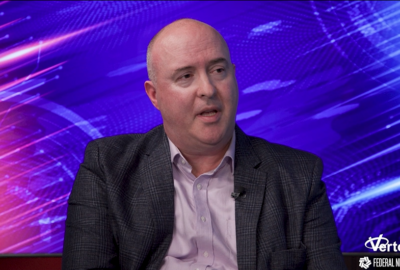
Insight by Commvault and AWS
Industry Exchange Data 2023: How to gain trust, ensure security in the cloud
Moving to the cloud requires a plan for securing data, which falls to the agency, while infrastructure cyber falls to the provider. We talk with experts from Co...
Federal agencies might be under a mandate to bring zero trust architectures to their systems, but they need to have a great deal of trust in their commercial cloud providers too.
The two ideas don’t contradict one another. Here’s how Richard Breakiron, senior director for strategic initiatives for Commvault’s Americas public sector, explained it, using the analogy of a hotel: Guests expect a high level of security and service reliability from a hotel, but that doesn’t extend to cash and valuables left in rooms. That’s on each guest.
Speaking at Federal News Network’s Industry Exchange Data, Breakiron said cloud security is a shared responsibility.
Cloud providers, agencies share security responsibilities
That means customers should trust but verify, said Sean Phuphanich, senior solutions architect Amazon Web Services, which partners with Commvault. “Trust in the cloud is not unlike normal relationships. You have to earn trust. It’s not something that’s just given,” Phuphanich said.
Cloud service providers can show several indicators of trustworthiness, including growing numbers of customers and rising levels of clearance certifications. Plus, a CSP should specifically have a shared security responsibility model with clients, he advised.
“We make it very clear what we take care of for your security of the cloud,” Phuphanich said. “Whereas the customer is responsible for security in the cloud.” That establishes boundaries, and it lets agencies put their attention toward a discrete set of security measures, he said.
“Customers are able to allocate their teams and resources to focus on a narrower set of issues, and be more effective at it,” Phuphanich said.
One “in the cloud” resource agencies are responsible for protecting is data. Breakiron said the challenge centers on “how you manage data from the endpoint all the way back to when it might need to be recovered.”
Multicomponent agencies seek solutions that can help them manage on a granular level since often they must have visibility into multitenancy environments, he said. Realizing greater business or mission value from data should underlie the choice of specific technologies that an agency selects for managing and securing its data, Breakiron said.
“When you start doing movement from your own technology on premises into a cloud environment, you’ve got to understand, ‘How do I get the data there? How is the data going to be protected? What is the business process associated with it? And who are my partners to help me?’ ” he said.
Cloud Smart reflects need to shift from CapEx to OpEx
CSPs, including AWS, have made significant investments in cybersecurity to get beyond the minimum levels of the Federal Risk and Authorization Management Program (FedRAMP). Now, cloud hosting exists at Impact Level 5 and above.
For AWS, a 2023 initiative aims to support the idea of being cloud smart and connecting government with best practices for managing cloud services from the private sector, Phuphanich said.
“Relative to the initial federal Cloud First policy, Cloud Smart is really a maturity of the adoption of cloud for agencies,” he said. Early adopters didn’t always optimize how they used cloud, “so they didn’t necessarily get all the benefits that they had originally anticipated,” he added.
Phuphanich recommended that federal IT staffs shift away from a capital expenditure model, in which networks and data center hardware undergo equipment change-outs at set intervals, to an operational expenditure model.
“Cloud is this kind of a continual process, where you can continue to optimize even potentially on a daily basis,” he said. “And you’ll see those benefits in effectively real time.”
Breakiron cited as an example an application that only needs to run 12 hours a day, five days a week.data A CSP can manage spin-ups and shut-downs according to an agency’s prescribed schedule. If the agency knows what services and capabilities the CSP can offer, it can avoid costs by not having an application spooled up 24/7.
“Cloud smart means you’ve done the research,” Breakiron said. “You know your business processes well enough, and you know how the cloud works.”
Check out all the sessions from Federal News Network’s Industry Exchange data on our event page.
Copyright © 2024 Federal News Network. All rights reserved. This website is not intended for users located within the European Economic Area.
Related Stories

Protected: Intelligent automation and cloud marketplaces help agencies optimize cost and speed cloud adoption

All agencies to give grant funding opportunities a facelift
Featured speakers
-

Richard Breakiron
Senior Director for Strategic Initiatives, Americas Public Sector, Commvault
-

Sean Phuphanich
Senior Solutions Architect, Amazon Web Services
-

Tom Temin
Host, The Federal Drive, Federal News Network
Upcoming Events
Related Stories
Top Stories

Richard Breakiron
Senior Director for Strategic Initiatives, Americas Public Sector, Commvault
Richard Breakiron is Commvault’s Senior Director, Strategic Initiatives, Americas Public Sector focused on the Federal community. He gained his extensive experience in developing, deploying and operating critical network IT and large data management systems while serving as an officer the Army, senior government civilian with the Army and DISA and U.S. security agencies.
A leader on many major IT program initiatives throughout his career, Richard oversaw the largest Base Realignment and Closure (BRAC) effort comprising over $3 billion in IT systems to support a $16 billion transformation of Army infrastructure. He further led the effort to realign the DoD’s Top-Level Architecture, by building a partnership with the DoD CIO and AFSPACECOM. While at the Pentagon with HQDA CIO/G-6, he served in leadership roles for strategic initiatives managing an Army-wide IT reform and network modernization effort.
Richard works alongside his Strategic Initiatives counterpart, Dave DeVries, where they both bring their close to 80 years of collective experience and insights from the DoD and Federal agencies to the states and local government as well as higher education. Since leaving government service, Mr. Breakiron has held positions as Executive VP, Public sector, root9B, an advanced Cyber security company; Senior Director, Cyber solutions for ViON Corporation; and initiated the standup of Ascolta, LLC, a data analytics subsidiary of ViON, as their General Manager and served on the board of Ascolta.
Richard and his wife are fortunate to enjoy a great rural life in Aiken, SC. They relax by gardening, do-it-yourself projects, playing tennis, an occasional Top Golf, and are learning sailing and scuba to enjoy their regular travel to SC beaches with their three ‘launched’ children.

Sean Phuphanich
Senior Solutions Architect, Amazon Web Services

Tom Temin
Host, The Federal Drive, Federal News Network
Tom Temin has been the host of the Federal Drive since 2006 and has been reporting on technology markets for more than 30 years. Prior to joining Federal News Network, Tom was a long-serving editor-in-chief of Government Computer News and Washington Technology magazines. Tom also contributes a regular column on government information technology.



